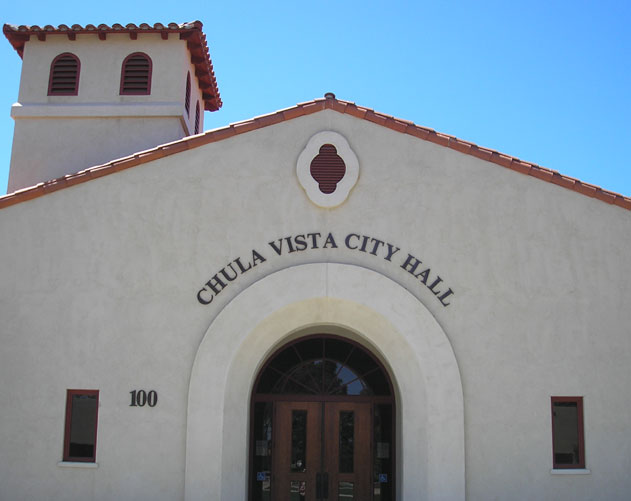Carolina Chavez is running for City Council District 1 being vacated by Council member John McCann. Chavez, 38, and a Democrat, said she grew up in the region, knows Chula Vista well, and in getting involved with politics at a very young age, she has worked on many local campaigns.

Chavez became involved in politics at a very young age working in economic development and international trade. She believes that Chula Vista, being a border town, that the community is a “floating population” and that brings more diverse opportunities for the city.
Chavez now works with San Diego District 3 Council member Stephen Whitburn as the director of Business Policy & Economic Development. She has six years of healthcare work experience, working on both sides of the border.
Chavez said economic development is her top priority, and coming out of the pandemic, businesses still need more help. She said her priorities are housing, affordable housing, healthcare, education, environment, and bi-national cross border international affairs.
Chavez said a university coming to Chula Vista is necessary, but that it must be approached as to what is best for the people, and best for the city.
“Overall, we need more college opportunities,” she said. “But we have to look at it from several directions and right now college opportunities are a luxury that should not be a luxury.”
Chavez said in her view, she sees the bayfront project will elevate Chula Vista and that you cannot detain progress. She said with building on its way, and other opportunities being presented for the bayfront, she wants to be part of the decisions in the bayfront’s future.
“We are looking to grow. We are looking to bring in this revenue into the city because at the end of the day, it is what is going to help this city,” she said.
Chavez said since she works for the city of San Diego, she is well aware of the homeless crisis.
“It is the worst community crisis that we have seen in our lifetime,” she said. “Recently in the city of San Diego they opened the U.S.S. Midway to open more beds for them to have a place to rest their head for the night and have the extra capacity of a shelter.”
Chavez said going back to the root of the problem, it breaks down to affordable housing.
“We need more affordable housing,” she said. “We have people on the verge of homelessness that are one paycheck away from losing their house. We see this every day with people calling in, in dire desperation. That their whole family is about to be on the streets. Because the lost their jobs, because a contract was not established, and many other things.”
Chavez said there are government programs, resources, which can help create programs and shelters. She said she thought the City handled the closure of Harborside Park well and called it a “good effort.”
“At the same time, there is more that we can do,” she said. “There are more resources into which we can tap. That is my economic development background, looking for ways to collaborate and get these federal, state, county resources, and create facilities, programs, where sometimes all they need is a leg up. For whole families, with these issues, it is unfortunate what we are living through. The price of housing is incredibly high. There are programs on the way to create housing around transportation. I am staff with San Diego Council member Stephen Whitburn, and with the MTS Board of Directors, we are seeing housing around transit centers to cut down on the carbon footprint, and creating housing for people who cannot afford it, or are on the verge of being homeless. These programs are crucial. Moving forward, we obviously need more affordable housing, and that is one of the things that I am going to be focused on.”
Chavez said with her work in government, she has the ability to create liaisons between the different entities.
“Having these relationships with the County, State, and Federal, and the people that endorse me are obviously people that want to work with me, it is going to make it easier to go knock on their door, when they are people that share the same ideals of what you expect for the region and for the community, to ask for assistance in where you would like to see the city going,” she said. “I think that is something that I do have that my opponent does not. And it gives me a little bit of an advantage in helping the community.”
Chavez said in her walks through the community she is hearing that many people have lost faith in government in general.
“The business community says it takes them a year and a half to two years to get a permit,’ she said. “I hope we can change that. We honestly need progress. We are always talking about Chula Vista not having the resources it needs, but we can create this and work with a purpose to make it right. We need to cut through the red tape. Some businesses just want to give their business a facelift and have not been able to because of how long this process takes.”
Chavez said this is important because the city is looking for progress, more investment, affordable housing, housing in general, and the city needs to find a way to be more efficient and more responsive to the people that have the resources to develop, to grow, and give certain areas in Chula Vista a facelift.
“It would be very narrow minded of myself to think that District 1 is an island,” she said. “We cannot think like that. I am going to be part of the city, a vote, decisions, legislation, things that will change not only Chula Vista, but it will have a regional effect.”
Chavez said what ever the problem is, the city needs to be able to tap in regionally to programs, elected officials, nonprofits, government entities, and not only solve the problems in the city, but collaborate in making regional changes, that in turn, will benefit the city.
Chavez said since she works for the city of San Diego, she is well aware of the homeless crisis.
“It is the worst community crisis that we have seen in our lifetime,” she said. “Recently in the city of San Diego they opened the U.S.S. Midway to open more beds for them to have a place to rest their head for the night and have the extra capacity of a shelter.”
Chavez said going back to the root of the problem, it breaks down to affordable housing.
“We need more affordable housing,” she said. “We have people on the verge of homelessness that are one paycheck away from losing their house. We see this every day with people calling in, in dire desperation. That their whole family is about to be on the streets. Because the lost their jobs, because a contract was not established, and many other things.”
Chavez said there are government programs, resources, which can help create programs and shelters. She said she thought the City handled the closure of Harborside Park well and called it a “good effort.”
“At the same time, there is more that we can do,” she said. “There are more resources into which we can tap. That is my economic development background, looking for ways to collaborate and get these federal, state, county resources, and create facilities, programs, where sometimes all they need is a leg up. For whole families, with these issues, it is unfortunate what we are living through. The price of housing is incredibly high. There are programs on the way to create housing around transportation. I am staff with San Diego Council member Stephen Whitburn, and with the MTS Board of Directors, we are seeing housing around transit centers to cut down on the carbon footprint, and creating housing for people who cannot afford it, or are on the verge of being homeless. These programs are crucial. Moving forward, we obviously need more affordable housing, and that is one of the things that I am going to be focused on.”
Chavez said with her work in government, she has the ability to create liaisons between the different entities.
“Having these relationships with the county, state, and federal, and the people that endorse me are obviously people that want to work with me, it is going to make it easier to go knock on their door, when they are people that share the same ideals of what you expect for the region and for the community, to ask for assistance in where you would like to see the city going,” she said. “I think that is something that I do have that my opponent does not. And it gives me a little bit of an advantage in helping the community.”
Chavez said in her walks through the community she is hearing that many people have lost faith in government in general.
“The business community says it takes them a year and a half to two years to get a permit,” she said. “I hope we can change that. We honestly need progress. We are always talking about Chula Vista not having the resources it needs, but we can create this and work with a purpose to make it right. We need to cut through the red tape. Some businesses just want to give their business a facelift and have not been able to because of how long this process takes.”
Chavez said this is important because the city is looking for progress, more investment, affordable housing, housing in general, and the city needs to find a way to be more efficient and more responsive to the people that have the resources to develop, to grow, and give certain areas in Chula Vista a facelift.
“It would be very narrow-minded of myself to think that District 1 is an island,” she said. “We cannot think like that. I am going to be part of the city, a vote, decisions, legislation, things that will change not only Chula Vista, but it will have a regional effect.”
Chavez said whatever the problem is, the city needs to be able to tap in regionally to programs, elected officials, nonprofits, government entities, and not only solve the problems in the city, but collaborate in making regional changes, that in turn, will benefit the city.

